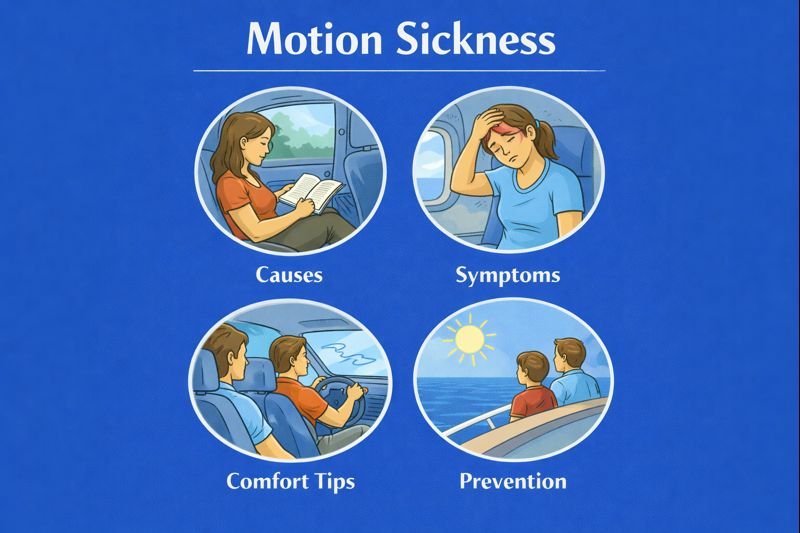Motion Sickness: Symptoms, Causes & Travel Awareness

Relevance in Canadian Travel, Work & Recreation
Motion sickness affects travellers, commuters, and individuals whose work involves vehicles or marine environments. Understanding the condition can help people prepare for trips, activities, and occupations that involve motion exposure.
Scenario (Mild & Realistic)
On a family road trip, Sarah began to feel uneasy and sweaty while reading in the backseat. She looked up toward the road through the windshield, opened a window for fresh air, and felt better once the car made a rest stop.
Who Is at Higher Risk?
Motion sickness can affect anyone, though it may be more common in:
-
Children
-
Pregnant individuals
-
Travellers on boats (seasickness)
-
People with limited outside view during travel
-
Individuals experiencing anxiety about travel
-
Situations with poor ventilation
Causes & Mechanism
The inner ear senses motion, while the eyes provide visual input. When the two do not match—such as feeling motion while sitting still inside a vehicle—mixed signals can develop, and the brain may interpret these signals as nausea or dizziness.
Symptoms of Motion Sickness
Symptoms often begin gradually and may include:
-
Uneasiness or discomfort
-
Cold sweats
-
Dizziness or lightheadedness
-
Pale appearance
-
Increased salivation
-
Headache or fatigue
-
Vomiting (in some cases)
Symptoms typically fade once the motion stops.
Management & Comfort Strategies
People differ in how sensitive they are to motion. Helpful comfort strategies may include:
-
Facing forward during travel
-
Focusing on a stable external point, such as the horizon
-
Ensuring fresh air or ventilation
-
Taking breaks when possible
-
Avoiding visually immersive activities such as reading during motion
-
Choosing seats with less motion (e.g., over the wings on airplanes or near the bow on calmer boat travel)
Relaxation and breathing techniques may also help reduce discomfort for some individuals.
Prevention & Travel Considerations
To reduce the likelihood of motion sickness:
-
Plan seating or positioning that reduces perceived motion
-
Use gradual acclimatization for new travel environments
-
Eat light snacks before travel and avoid heavy meals if they worsen symptoms
-
Maintain good airflow when possible
-
Consider behavioural strategies such as minimizing head movement or focusing gaze outside the vehicle
Individuals with frequent or severe motion sickness sometimes explore personalized strategies through health professionals, especially when symptoms interfere with daily travel or work.
FAQ
Is motion sickness dangerous?
Motion sickness is uncomfortable but generally not dangerous. Symptoms usually subside once motion stops.
Why does motion sickness happen on boats?
Marine environments create continuous movement that the eyes may not detect if the traveller is indoors or lacks a view of the horizon.
Can anxiety make motion sickness worse?
Yes. Worry or anticipation of symptoms may heighten awareness of discomfort.
Do children outgrow motion sickness?
Some children experience fewer symptoms as they age, though sensitivity varies widely.
Educational Note
This article provides public education about motion sickness and travel awareness. Sensitivity and management strategies vary among individuals. Health professionals can assess concerns that interfere with daily travel or occupational requirements.
